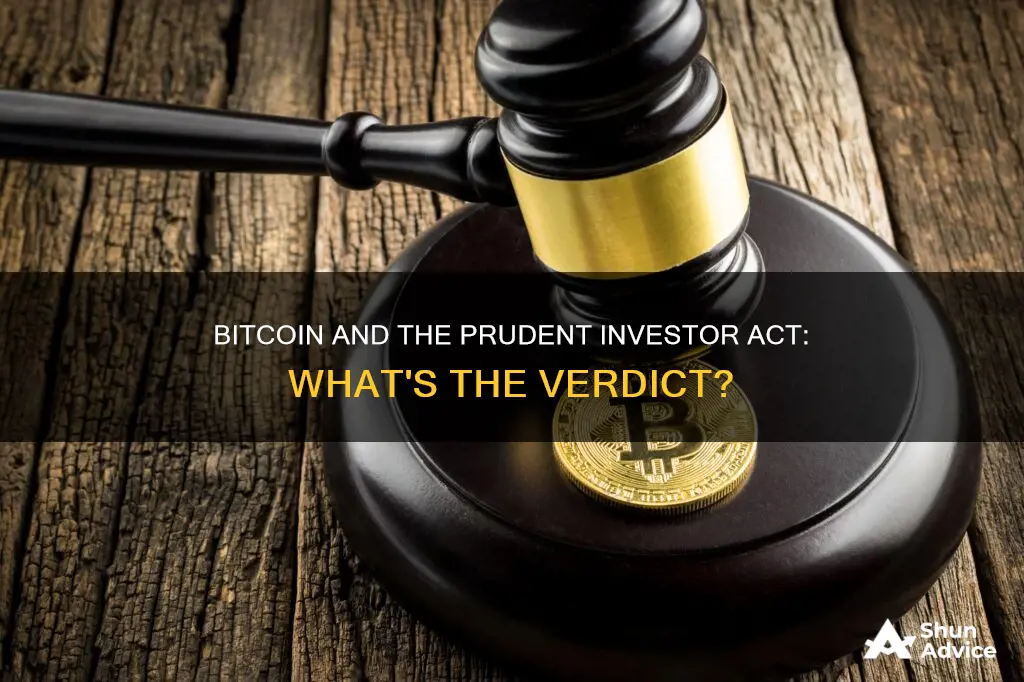
Bitcoin and other cryptocurrencies have become a popular way for investors to diversify their portfolios and realise substantial growth. However, the volatile nature of the cryptocurrency market, coupled with regulatory uncertainty, has led to caution among institutional investors and trustees. The Uniform Prudent Investor Act (UPIA) sets out guidelines for trustees when investing trust assets and allows for a modern portfolio theory and total return approach. This raises the question: does Bitcoin qualify as a prudent investment under the UPIA?
What You'll Learn

Bitcoin's volatility and risk
Bitcoin is a financial tool that carries risks, just like any other payment method or currency. However, its risks are slightly different from traditional currencies and payments. One of the main differences is that bitcoin is highly volatile.
Bitcoin has been referred to as "fake internet money" since its creation. However, it has been making waves in the financial world, with investors from all over buying bitcoin as they feel it is a safer method of storing and transferring value compared to precious metals or traditional payment methods.
Bitcoin's volatility remains one of its main barriers to mass adoption, especially if it is to be used as a form of payment. However, if the intention is to speculate and trade on bitcoin exchanges, then the massive fluctuations may be a good thing.
Bitcoin is a new breed of technology, which is part ideology and part payment method. The technology is still under development, and we are still discovering potential use cases for blockchain technology. As such, there is always a risk involved when investing in bitcoin from a technological development point of view. Even the best solutions and implementations may not be viable in the end if nobody adopts them.
From a technological standpoint, there is hardly any risk when investing in bitcoin itself. Investing in a company that is working on this new technology is a different matter, but this principle is the same for any company one wants to invest in. Bitcoin company investments are not inherently riskier than investing in any other startup company.
When it comes to speculating on bitcoin prices, however, the story is different. If one looks at bitcoin as an investment vehicle that will likely gain value, there are quite a few risks attached. Speculating on price volatility is never a good idea, and bitcoin is proving to be rather volatile on a daily basis.
Bitcoin's anonymous creator, Satoshi, asks: "Why is Bitcoin volatility bad? Volatility is risk. Some risky things are good... The problem arises when there is too much volatility or risk relative to their desired use."
One of the main problems that cause Bitcoin’s volatility is that there is simply too much of it held in the hands of too few people. Large crypto whales can create massive swings in prices by selling off big quantities. Low liquidity at times results in bigger moves and higher volatility for Bitcoin.
The Uniform Prudent Investor Act (UPIA)
The Uniform Prudent Investor Act (UPIA) is a standard that sets out guidelines for trustees to follow when investing trust assets on behalf of a trustor. It also applies to financial professionals who make recommendations or place trades on behalf of clients.
The UPIA requires trustees to take into account a diversified portfolio approach that follows modern portfolio theory and a total return approach. No category or type of investment is deemed inherently imprudent. Instead, suitability to the portfolio's needs is considered. As a result, investment junior lien loans, investments in limited partnerships, derivatives, futures, and similar investment vehicles are now possible.
The prudent investor rule, which is now also referred to as the prudent person rule, states that a fiduciary should invest trust assets as if they were their own, considering the needs of the trust's beneficiaries and avoiding investments that are excessively risky.
While the UPIA allows for riskier investments, speculation and outright risk-taking are not sanctioned by the rule and remain subject to possible liability.
Strategizing Your Bitcoin Investment: A Guide
You may want to see also

The Uniform Prudent Investor Act (UPIA)
The UPIA is an update to the former "Prudent Man" standard, which was based on Massachusetts common law written in 1830 and revised in 1959. The Prudent Man Rule stated that a trust fiduciary was required to invest trust assets as a "prudent man" would invest his own assets, taking into account the needs of the beneficiaries and the need to preserve the estate.
The UPIA makes four main changes to the previous standard:
- A trust account's entire investment portfolio is considered when determining the prudence of an individual investment. A fiduciary would not be held liable for individual investment losses, provided the investment was consistent with the overall portfolio or investment objectives.
- Diversification is explicitly required as a duty for prudent fiduciary investing.
- No category or type of investment is deemed inherently imprudent. Suitability to the portfolio's needs is considered instead.
- A fiduciary is permitted to delegate investment management and other functions to qualified third parties.
The most important change introduced by the UPIA is that the standard of prudence is applied to any investment in the context of the total portfolio, rather than to individual investments. This shift from the Prudent Man Rule's focus on individual investments to the UPIA's focus on the overall portfolio allows for a greater degree of diversification in investment portfolios. Trustees are now able to include derivatives, commodities, and futures in their portfolios, which, while individually riskier, can theoretically reduce overall portfolio risk and boost returns.
The UPIA also reflects a "modern portfolio theory" and "total return" approach to the exercise of fiduciary investment discretion. This approach requires fiduciaries to utilize modern portfolio theory to guide investment decisions and conduct a risk versus return analysis. As a result, a fiduciary's performance is measured based on the performance of the entire portfolio rather than individual investments.
Bitcoin's Legitimacy: A Viable Investment Option?
You may want to see also

The Prudent Man Rule
The rule directs trustees to act as a "prudent man" would when investing his own property, taking into account the needs of beneficiaries, the need to preserve the estate (or corpus of the trust), and the amount and regularity of income. It also requires trustees to avoid speculative or risky investments, such as penny stocks, second mortgages or new business ventures. The rule does not require all investments to be lucrative, but it prohibits putting all funds into money-losing endeavours.
While the Prudent Man Rule does not specifically mention Bitcoin or other cryptocurrencies, it is worth noting that cryptocurrencies are considered speculative and highly volatile assets. As such, a fiduciary may need to carefully consider the level of risk involved and ensure that any investment in cryptocurrencies is consistent with the needs and risk tolerance of the beneficiaries.
Mr Beast's Bitcoin Adventure: Did He Invest?
You may want to see also

Trustees' fiduciary duties
The Uniform Prudent Investor Act (UPIA) is a set of guidelines for trustees to follow when investing trust assets on behalf of a trustor. Trustees are fiduciaries, legally bound to act in the best interests of their clients. Trustees must make decisions that are in the best interest of the beneficiary, as the latter holds equitable title to the property.
The UPIA requires trustees to take into account a diversified portfolio approach that follows modern portfolio theory and a total return approach. This means that trustees can include investments with a relatively higher degree of risk, such as derivatives, commodities, and futures, which can theoretically reduce overall portfolio risk and boost returns.
The prudent investor rule, which is codified in the UPIA, requires fiduciaries to invest trust assets as if they were their own, considering the needs of the trust's beneficiaries and avoiding excessively risky assets that may result in a steep drop in values. Trustees must also avoid any conflict of interest.
Fiduciaries are legally and ethically bound to act in the best interests of their clients and must put their clients' interests ahead of their own. This is known as the "prudent person standard of care".
A Guide to Investing in Coinbase from India
You may want to see also

The future of Bitcoin as an investment
Bitcoin, the original cryptocurrency, has been on a rollercoaster ride since its creation in 2009. It was intended to revolutionize the way people could access and control their money, but that revolution has yet to come to pass. The cryptocurrency's first decade was marked by scandals, missteps, and wild price swings, and its second decade has been no different. So, what does the future hold for Bitcoin as an investment?
Bitcoin is likely to remain popular with cryptocurrency speculators over the next decade. Its price and popularity with certain investors are important factors in its future. However, it's critical to address the issues of decentralization, scalability, and security for Bitcoin to gain traction as more than a speculative investment.
The Bitcoin blockchain was supposed to be widely distributed to the public, but the rapid climb in the cryptocurrency's market value led to the emergence of large-scale mining operations, which now control a significant portion of the blockchain and the network's processing power. This has resulted in the Bitcoin blockchain being more centralized than decentralized, which goes against the original intention of Bitcoin being decentralized and controlled by the public.
Another issue facing Bitcoin is its scalability. Years after its introduction, Bitcoin can only handle a maximum of six to eight transactions per second, which is extremely slow compared to other blockchains that can process about 8,700 transactions per second. This has led to long confirmation times and high transaction fees.
Security is also a concern for users and investors, with scammers, hackers, and thieves continuing to target people who hold Bitcoin. While the blockchain itself remains secure, the interfaces used to access keys and the blockchain are vulnerable.
In conclusion, while Bitcoin may remain popular with a certain group of investors, its future as a widespread investment is uncertain. It faces several challenges and regulatory developments that could impact its future. Only time will tell whether Bitcoin will soar higher or face further challenges, and investors should approach it with caution.
Ameritrade's Bitcoin Investment: A Beginner's Guide
You may want to see also
Frequently asked questions
The Uniform Prudent Investor Act (UPIA) is a standard that sets out guidelines for trustees to follow when investing trust assets on behalf of a trustor. It also applies to financial professionals who make recommendations or place trades on behalf of clients.
The Uniform Prudent Investor Act adopts a modern portfolio theory (MPT) and total return approach to the exercise of fiduciary investment and discretion. It considers the entire investment portfolio when determining the prudence of an individual investment and explicitly requires diversification.
Investing trust assets in Bitcoin is not strictly prohibited by state law. The UPIA does not allow unrestrained speculation and outright risk-taking. Bitcoin may be considered too volatile when viewed in isolation, but it can be appropriate when viewed as part of a total management strategy.







